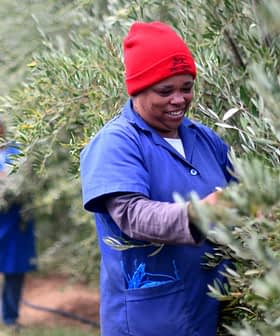Creative Packaging Helps Award-Winning Producer Sell More EVOO
At a recent fair, Brenda Wilkinson of Rio Largo Olive Estate realized some people bought her olive oil for the unique designs on her bag-in-box packages.
 Brenda Wilkinson, co-owner of Rio Largo Olive Estate
Brenda Wilkinson, co-owner of Rio Largo Olive Estate A surprising decision over a decade ago has given the award-winning olive oils of one South African producer another level of notoriety.
Brenda Wilkinson, co-owner of Rio Largo Olive Estate, and her husband, Nick, recently realized that their 2011 decision to sell foil-packaged extra virgin olive oil in cardboard tubes had created a large market for their packaging.
She told Olive Oil Times she witnessed the reaction to their cardboard on-tap tube decanters at an artisan market late last year.
“The customers would come around the corner and stand in awe,” she said. “[Our tube decanters are] so pretty, they could not help themselves. They just wanted to buy on design alone, albeit the olive oil was of exceptional award-winning quality.”
See Also:Award-Winning Producer Sees a Bright Future for South African Olive Oils“But if I am honest,” Wilkinson added, “they just wanted to walk away with the pretty designs. Not one design outsold any other, as there is something for everyone. It was fascinating.”
Wilkinson said Rio Largo had created decanters with more than 56 designs. They also offer a personalized gift range for corporate clients.
She said they won a packaging award for their decanters at a recent competition in the United Arab Emirates. “These decanters and their value are finally being recognized,” she said.
Wilkinson described creating the designs for their decanters as a journey. “We certainly pioneered the bag-in-tube phenomenon,” she said.
She added that they had a fun label designed by a local artist Frans Groenewald, whose creations are known for wordplay.
“Our first label was called Freedom of the Press,” Wilkinson said. “We began a series of Groenewald’s designs such as ‘Taste of Africa’ with Table Mountain in the background, Bon Appetree and many others that brought a smile to everyone that saw them. That is what we wanted, to share the joy.”
“Sadly, Frans suffered a stroke,” she added, “and is no longer able to paint with such detail. After a wonderful birthday celebration surrounded by flowers, it was a spur-of-the-moment decision to embrace a floral theme, as we thought a gift of health in a ‘floral bouquet’ would go down well.”
Wilkinson said their range of decanters with floral designs took their business to another level.
The producers also released an edition of decanters with rhino labels, of which a percentage of the sales was pledged to saving endangered rhinos.
She said their decision in 2011 to use bag-in-box packaging for their extra virgin olive oil was based on maintaining the freshness of their product.
“Our slogan is ‘try it, you’ll love it.’ And to ensure that our customers do indeed love that great taste, we needed to ensure that the quality of the oil was maintained upon purchase to the last drop,” she said.
“Our oils are stored in stainless steel tanks and only packed to order,” Wilkinson added. “We like to think that we are sharing that same great taste in these little ‘mini tanks,’ which are the bags we use to place in the outer decanters.”
Wilkinson explained that extra virgin olive oil deteriorates during storage due to lipolysis, which causes hydrolytic rancidity and affects the flavor of the oil.
“A second process that causes a greater decline of quality during storage is oxidation, which causes oxidative rancidity,” she said.
Wilkinson added that both processes result from oxygen coming into contact with the oil, underscoring the importance of packaging oil in airtight containers.
She further explained that the temperature at which the oil is stored affects oxidation, and exposure to light makes the oil less stable.
Wilkinson said researchers at the Andalusian Institute of Agricultural, Fisheries, Food and Organic Production Research and Training (IFAPA) found on-tap bag-in-box packaging best protects extra virgin olive oil from oxidation, compared to other types of packaging.
Additionally, this option maintains all quality parameters required for the ‘extra virgin’ category for at least six months.
She concluded they are working on another innovative idea to take their packaging to the next level, but she is not divulging anything at this stage.








